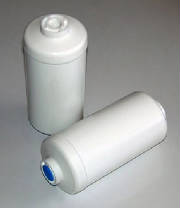|
 Do your filter elements reduce fluoride in the water? Do your filter elements reduce fluoride in the water?
No, in order to reduce fluoride in your water you will need to use post filters that work in conjunction with
the filters in your system. We have two types, PF-2's, which are used in conjunction with the Black Berkey®
purification elements, and the PF-4 filters that are used in conjunction with our ceramic filters.
I noticed that the PF-4 elements also remove MTBE and
heavy metals. Should I use these with my Black Berkey® purification elements?
No, the PF2's are used in conjunction with the Black Berkey®
purification elements and the PF-4 elements are used in conjunction with the ceramic filters. The Black Berkey®
elements remove MTBE and reduce heavy metals whereas the ceramic filters do not therefore; we incorporated MTBE and heavy
metals reduction capabilities into the PF-4 elements.
What
is the life of the PF-4 filters?
Each
set of four PF-4 filters is will last for 1,000 gallons or six months whichever comes first. The reason for the six-month
limitation is that the carbon within the PF-4 filters extracts contaminates that can be nutrients on which bacteria can grow.
If the filters are used longer than six months “grow-through” can occur.
What is the life of the PF-2 filters?
Each set of two PF-2 filters is will last for 1,000 gallons. Since these elements contain pure fluoride
and arsenic reduction media and no carbon, there is no six-month limitation rule as is the case with the PF-4 elements.
How do I know when 1,000 gallons
has been filtered and when its time to replace the elements?
The best way to gauge when to replace the filters is to do the following:
- Keep a track of how many times per week you need to refill your
system.
- Then multiply that figure times the capacity
in gallons of your particular system (for example the Berkey Light™ system is 2.75 gallons) to determine
Total Gallons Used Per Week.
- Finally divide
the Total Gallons Used Per Week into the 1000 gallons and that will tell you how many weeks before the filters should be replaced.
- Next calculate the future date for replacement
(52 weeks per year) and write that date on a sticker and attach it to the bottom of your system for future reference.
By the way, if you have been using your fluoride
reduction filters for some time now, you can still use the above formula to determine when to replace the elements. Just count
forward from the date you purchased your elements. I installed my PF-2 elements but my water is a bit cloudy and why does it have a funny taste?
The odd taste is from process dust
that may not have been washed free from the filter elements during the conditioning process. Please remove the PF-2 elements
and re-condition them for 60 seconds on both ends. This should expel any residual process dust and fix the problem.
Do the PF-2 elements replace the Black
Berkey® purification elements?
No,
the Black Berkey® elements fit into the base of the upper chamber with the stems of the filters
protruding through the holes in the base of the upper chamber. The protruding stems are threaded and the PF-2 filters screw
onto these threaded stems so that the PF-2's hang down into the lower chamber. The water flows from the upper chamber, through
the Black Berkey® elements, into the PF-2 filters and then into the lower chamber. The “PF”
in PF-2 stands for Post Filter. So in answer to your question, no they do not replace the black filters but rather work in
conjunction with them.
If I
begin using use the PF-2 elements, will I need more counter space for my system?
No, the PF-2's attach to the stems of the Black Berkey® elements
and hang down into the interior of the lower chamber of the system requiring no additional counter space.
I understand that the media used within the fluoride
reduction elements is activated alumina, it that the same thing as aluminum?
The media used to extract the fluoride and arsenic is activated alumina. Since fluoride is a by-product
of aluminum production, fluoride has a natural affinity to recombine with activated alumina making it an ideal extraction
media. We are not chemists but will communicate our understanding on the subject. Both nutritionist and lab technicians have
informed us that aluminum and alumina are two separate animals. Aluminum can cross the blood brain barrier and cause problems
with the brain whereas alumina is inert. It is our understanding that alumina is oxidized aluminum. Aluminum is regulated
whereas alumina is not for example, alumina is the material used for making the paste in toothpaste. At any rate, when testing
for aluminum in water, most tests cannot distinguish between aluminum ions and oxidized alumina. Since we are not chemists,
we tested the effluent from the filters and included that information in our brochure. While we were not required to do so,
we felt that it was important to disclose to our customers what our results were so that they would have the necessary information
to do further research on the issue should they desire to do so. We thin it was significant in the test we conducted using
the combination of Black Berkey® elements and PF-2 elements there was a net reduction in the
tested aluminum content of the source water vs. the purified water. Again that test did not distinguish between aluminum and
alumina. The bottom line is that the media utilized is oxidized alumina and not aluminum.
What are the dimensions of the PF-2 and PF-4 elements?
The individual elements are 6” in length and
2.5” in diameter.
I have high PH in my water, will that reduce the efficiency of the PF-2 elements?
That is correct, high or low PH impedes the ability of the
media to remove fluoride.
|